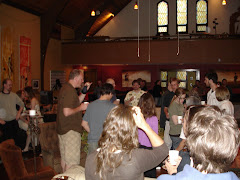Blog Entry – 8/9/09
I’ve always had a love/hate relationship with the Bible. I love its stories, its characters, its drama. I hate its racism, its ethnocentrism, and its assumptions about God taking sides and supporting things like wars and ethnic cleansing. While I’m not in the habit of trying to defend the Bible against the very legitimate criticism it receives, I do think there is one hermeneutical lens that helps alleviate or at least ameliorate some of what John Shelby Spong calls “the terrible texts of the Bible.” I am speaking of the Bible’s communal orientation. Consistently in both testaments, whenever the word “you” appears, it is second person plural – not singular. This means that in the commandments, for instance, all the Thou (You) shall not’s are speaking to the entire community as a whole. When God promises things to the Israelites or when Jesus speaks of what the disciples will be able to do in his name, those “you’s” are plural.
What all this means is that God is seeking to form a community for himself that will draw others to Him. He has always been in the business of creating a community through which to bring about his will and to build his kingdom here on earth. If a community is to be worth anything and to function at all, people in it cannot be killing each other, sleeping with each other’s spouses, stealing from one another, etc. And if that community is going to effectively woo others to God and to God’s will, such behaviors are even more important to avoid.
In our American society’s rush to be ultra-individualistic, I think we’ve misread the Bible by over-personalizing it, turning Christianity into a “me and Jesus” thing. It continues to amaze me that the “personal relationship with Christ” notion, made so prevalent by American Evangelicals, literally occurs nowhere in the scriptures. Jesus made no reference to it; Paul made no reference to it; the Epistle writers made no reference to it. It simply isn’t scriptural, and yet our country has bought into this individualistic corruption of the Bible’s collective message, hook, line, and sinker, without realizing what we’ve lost in the process.
God’s interest from Abraham and Moses right through to the prophets and Jesus was, is, and always will be to get people together, to form and shape a risk-taking community of disciples who will do God’s biding. It can’t be done alone. There is no such thing as a rugged Christian individualist. In fact, the gospel as Jesus articulated cannot be lived out on one’s own. Everything in the Bible should be read with this hermeneutical lens. I enjoyed reading Atlas Shrugged and The Fountainhead as much as anybody else, but Ayn Rand didn’t write the Hebrew Bible nor the Christian New Testament. Judeo-Christian spirituality is not about individuals pulling themselves up by their bootstraps and climbing the stairway to heaven. It is, instead, about God’s dream for a community of people to live together in such a way that God’s kingdom comes and God’s will is done on earth as it is in heaven.
As we all continue what I hope is our regular discipline of studying the Judeo-Christian scriptures, may we learn to read every “you” as a “you all” – or a “y’all” if you prefer. See if it doesn’t make a huge difference in what it is that God has been trying to tell us.
Saturday
Subscribe to:
Post Comments (Atom)
Eloise Anna Jones

A Reader at 8 months!
papa and Weezie

it doesn't get any better than this!


















No comments:
Post a Comment